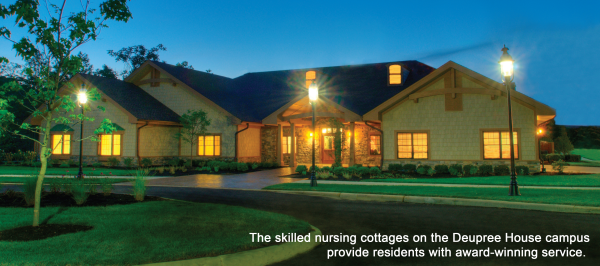
Many middle and upper-income older adults are in a stronger financial position to afford a premier retirement community than they often realize, says Chip Workman, director and senior wealth advisor at Mercer Advisors in Montgomery, Ohio.
Workman’s clients are typically better off than the average retiree — what he describes as “millionaire-next-door” types, with investable assets ranging from $1 million to $10 million. Despite their financial strength, many of these individuals still worry more than necessary about their long-term financial security, often underestimating their ability to comfortably afford an enhanced lifestyle in retirement.
More affordable than many realize
“So many of us walk around with financial stress of one kind or another,” Workman said recently. “Sometimes it's well placed, unfortunately, but a lot of times it's not.”
For many older adults, that stress often stems from uncertainty about whether they can afford the next chapter, particularly when it comes to moving into a premier retirement community. But education, whether through conversations with a financial advisor like Workman or directly with a continuing care retirement community (CCRC), can go a long way in easing those concerns.
CCRCs provide a full continuum of care — from independent living to assisted living and skilled nursing — allowing residents to age in place while receiving the support they need as their health needs change.
“Oftentimes – at least with the folks we are fortunate enough to work with – it's much more affordable than they think,” Workman said. Once people understand how to leverage their home equity and consider the costs they’ll no longer face after moving, such as home maintenance, property taxes, or even some healthcare expenses, the financial picture often becomes far more manageable.
Still, he says, many people get stuck in a cycle of worry, and think: “All I hear is that these places are unbelievably expensive, and how can I ever possibly afford that?” he said. “But once we sit down and really run the numbers, that concern often fades.”
Home equity often is key
When older clients have an interest, Workman talks a lot with them about CCRCs. He discusses long-term-care insurance, which may or may not be a good idea, depending on several factors.
Typically, when clients are considering moving into CCRCs, they’re going to sell their home, and its equity often is used as payment toward the community’s entry fee.
Using round numbers, a couple may sell a house they own outright for $500,000, and the community they’re looking at may have an entry fee of $200,000.
The proceeds from the home sale typically would go toward the entry fee, and he also would look at what the remaining $300,000 could do with short-term or medium-term growth “to cover the monthly costs for several years,” he said. “Oftentimes, that's a pretty key piece to making the math work on that kind of a move.”
Related Blog: Retirement Planning 101: What is an Entrance Fee?
There are also monthly fees to be paid to the CCRC, but other costs associated with owning a home disappear for someone who moves into a retirement community. Those expenses vary, depending on the campus.
“We can typically show clients what kind of spending they’ve done in the recent past,” Workman said. “And then we work through, ‘OK, what expenses would continue to exist, and which ones would not?’”
Some costs vanish!
Anything from a homeowner’s current utility or property-tax bills will no longer be something they pay.
Depending on the retirement community, other expenses that no longer apply include meals, utilities, cable-television costs, health clubs, the cost of their house’s alarm system, and the landscapers, among other things.
“When you start to peel those expenses off, the monthly fees often look more attractive than what they're paying to live in their home,” Workman said.
Benefits of a fiduciary advisor
At Mercer Advisors, Workman works is a fiduciary financial advisor, which means he must act in the client’s best interests. Advisors who are not fiduciaries may be able to recommend investments that pay them a commission.
Non-fiduciary advisors can face conflicts of interest between the needs of their clients and their own financial benefits.

Pro Tip 1: Plan for your future before a disaster
One key piece of advice Workman offers is to get to know retirement communities in your area sooner rather than later.
The worst time for older adults and their families to have to make a significant decision about their future is the day of, or days after, a health crisis.
“That tends to be very expensive,” he said. “It’s unbelievably stressful – on the whole family, oftentimes. You don't know what you want, you don't know what's available.”
Also, in many retirement communities, “the ideal situation may not be available right away, or at all,” Workman said. “Doing that planning in advance can just make a huge difference.”
Pro Tip 2: Don’t dismiss retirement campuses without exploring them
Another key suggestion he has is not to dismiss the possibility of living in a retirement community.
People shouldn’t automatically cling to the desire to remain in their house without knowing the alternatives.
“I think you shouldn’t make that decision absent having some real information – visiting a few communities, seeing what's out there,” he said. “If you do that, and you say, ‘No, I still can't imagine myself there, I want to say home,’ fair enough. But if you're not looking at those options, you may be missing out on something.”
“Obviously, I see every day in my work with ERS (Episcopal Retirement Services, the non-profit organization that operates the Deupree House and Marjorie P. Lee retirement campuses in Cincinnati’s Hyde Park neighborhood), people really thriving in their communities,” he said.
Workman is a member of the ERS Board of Directors, and also on the ERS Foundation Board of Directors.
Related Blog: The Proven Benefits of Living in a Continuing Care Retirement Community
Aside from the continuum of care that CCRCs offer, another advantage of living in a retirement community is the proximity to neighbors and future friends. For people in their upper-80s or 90s, it’s difficult to walk out of their suburban homes to see those who live next door.
But his 97-year-old grandmother lives in a retirement community, and for her “to walk next door at her community is pretty simple. She’s able to still do some activities. And she likes a wine tasting here and there,” he said.

Do you have enough assets to move into a retirement community?
Determining whether you have the financial resources to move into a retirement community is a key concern for many older adults. While a thorough evaluation with a financial advisor is a smart first step, another effective way to assess your readiness is by submitting an entrance application directly to the community. Once the application is filed, accountants will review your age, income, and overall financial picture to determine eligibility and affordability.
To begin the application process or ask any questions, please reach out to our community directors:
Deupree House
Karen Immell | Community Relations Director
513-561-4200 | kimmell@erslife.org
Marjorie P. Lee
Jenn Schlotbom | Community Relations Director
513-533-5000 | jschlotbom@ERSlife.org
Episcopal Church Home
Elizabeth Pace | Community Relations Director
502-736-8043 | epace@ERSlife.org
Want to learn more about choosing a retirement community and the benefits of moving into a CCRC? Download our ERS Decision Guide today!












